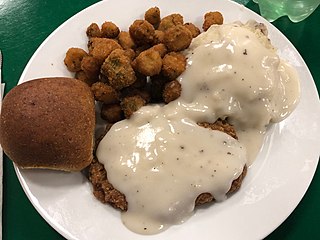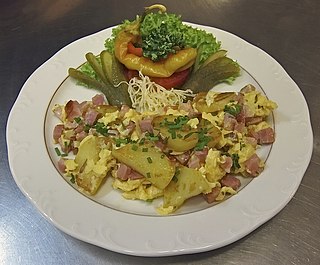
Placerville is a city in and the county seat of El Dorado County, California. The population was 10,747 as of the 2020 census, up from 10,389 as of the 2010 census. It is part of the Sacramento–Arden-Arcade–Roseville Metropolitan Statistical Area.

An omelette is a dish made from eggs, fried with butter or oil in a frying pan. It is a common practice for an omelette to include fillings such as chives, vegetables, mushrooms, meat, cheese, onions or some combination of the above. Whole eggs or egg whites are often beaten with a small amount of milk, cream, or water.

Spanish omelette or Spanish tortilla is a traditional dish from Spain. It is celebrated as one of the most popular dishes of the Spanish cuisine. It is an omelette made with eggs and potatoes, usually including onion. It is often served at room temperature as a tapa.

Chicken-fried steak, also known as country-fried steak, is an American breaded cutlet dish consisting of a piece of beefsteak coated with seasoned flour and either deep-fried or pan-fried. It is sometimes associated with the Southern cuisine of the United States. It is breaded and fried with a technique similar to the more common fried chicken, hence "chicken-fried". When deep-fried, it is usually referred to as "chicken-fried steak". Pan-fried versions are typically referred to as "country-fried steak".

A fried egg is a cooked dish made from one or more eggs which are removed from their shells and placed into a frying pan and fried. They are traditionally eaten for breakfast in many countries but may also be served at other times of the day.

The cuisine of California reflects the diverse culture of California and is influenced largely by European American, Hispanic American, East Asian and Oceanian influences, and Western European influences, as well as the food trends and traditions of larger American cuisine.

Fried rice is a dish of cooked rice that has been stir-fried in a wok or a frying pan and is usually mixed with other ingredients such as eggs, vegetables, seafood, or meat. It is often eaten by itself or as an accompaniment to another dish. Fried rice is a popular component of East Asian, Southeast Asian and certain South Asian cuisines, as well as a staple national dish of Indonesia. As a homemade dish, fried rice is typically made with ingredients left over from other dishes, leading to countless variations. Fried rice first developed during the Sui Dynasty in China.

The oyster omelette, also known as o-a-tsian, o-chien or orh luak, is a dish of Min Nan origin that is renowned for its savory flavor in its native Minnan region and Chaoshan, along with Taiwan and many parts of Southeast Asia, such as Philippines, Thailand, Malaysia or Singapore, due to the influence of the Hokkien and Teochew diaspora.

An egg sandwich is a sandwich with some kind of cooked egg filling. Fried eggs, scrambled eggs, omelette, sliced boiled eggs and egg salad are popular options. In the last case, it may be called an egg salad sandwich.
A collop is a slice of meat, according to one definition in the Oxford English Dictionary. In Elizabethan times, "collops" came to refer specifically to slices of bacon. Shrove Monday, also known as Collop Monday, was traditionally the last day to cook and eat meat before Ash Wednesday, which was a non-meat day in the pre-Lenten season also known as Shrovetide. A traditional breakfast dish was collops of bacon topped with a fried egg.

Pajeon is a variety of jeon with scallion as its prominent ingredient, as pa (파) means scallion. It is a Korean dish made from a batter of eggs, wheat flour, rice flour, scallions, and often other ingredients depending on the variety. Beef, pork, kimchi, shellfish, and other seafood are mostly used. If one of these ingredients, such as squid, dominates the jeon, the name will reflect that; e.g. ojing'eo jeon (오징어전) is 'squid jeon'.

Ham and eggs is a dish combining various preparations of those two ingredients. It has been described as a staple of "an old-fashioned American breakfast". It is also served as a lunch and dinner dish. Some notable people have professed an affinity for the dish, such as American entrepreneur Duncan Hines and the Manchurian Emperor Puyi. Similar dishes include bacon and eggs, Spanish eggs, the Denver omelette and eggs Benedict.

The Tadich Grill is an American seafood restaurant located in San Francisco, California. Founded in 1849, it is the oldest running restaurant in California. Based in the Financial District, the restaurant sits on 240 California Street. The dining experience features Croatian-style cooking techniques that include grilling seafood over mesquite- and charcoal-broilers for varying flavor profiles and uniform broiling.

Bauernfrühstück is a warm German dish made from fried potatoes, eggs, green onions, parsley, and bacon or ham. Despite its name, it is eaten not only for breakfast but also for lunch and dinner.
Alexander Howison Murray Jr. (1907–1993), known as Sandy Murray, was a two-time mayor of Placerville, California and three-time president of the county's chamber of commerce, who championed regional development, including the building of U.S. Route 50 in California (US 50) and was a regular page-one name in the Placerville Mountain Democrat.

Tortang talong, also known as eggplant omelette, is an omelette or fritter from Filipino cuisine made by pan-frying grilled whole eggplants dipped in an egg mixture. It is a popular breakfast and lunch meal in the Philippines. A common variant of tortang talong is rellenong talong, which is stuffed with meat, seafood, and/or vegetables.
Lloyd Raffetto also known as Lloyd A. Raffetto, Lloyd Alexander Raffetto, and "Raff" (1897-1988), was a noted Italian-American-Irish-American co-inventor of an ice cream manufacturing process, entrepreneur, and banker who owned the Raffles Hotel and co-founded the Mother Lode Bank, both of Placerville, California.















